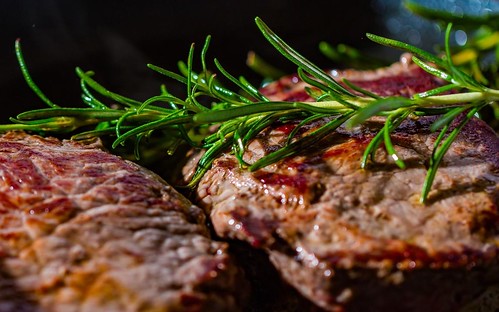Today we have a special GUEST POST by Virgil Anderson of Mesothelioma.net
The paleo and ketogenic diets are more popular than ever before and for good reasons. They have been shown to be beneficial in a number of ways, from cutting out processed foods to helping people lose weight. There is also evidence that these diets may provide important benefits for people living with and being treated for various types of cancer, like mesothelioma or lung cancer.
The Paleo Diet and its Health Benefits
The paleo diet has a pretty simple basis: don’t eat anything our Paleolithic ancestors wouldn’t have eaten. The Paleolithic was before agricultures, so that means no grains or dairy. Instead, on the paleo diet you eat meat, game, poultry, fish, vegetables, seeds, fruits, and nuts. Although there may have been beans and legumes around 10,000 years ago, the paleo diet avoids these as well.
Perhaps the best thing about the paleo diet is that it relies on whole foods and eliminates processed ones. There is no vegetable oil on this diet, and no junk food or packaged foods. The elimination of dairy, grains, and beans is more controversial, but the idea is that 10,000 years is not a long enough time to have evolved to digest them properly.

Some of the known health benefits of the paleo diet include
In another study, researchers actually found that some types of cancer cells, including squamous long cancer cells, are highly dependent on sugar for growth. With less sugar, tumors may grow more slowly, which obviously benefits the patients.
Benefits of the Ketogenic Diet
The keto diet is similar to the paleo diet. The idea is to eat fewer carbohydrates and more fats. The philosophy behind the diet is totally unrelated, but it ends up being very similar in terms of what you can eat. The idea of the diet is that eating more fat and fewer carbs forces the body into ketosis, a state in which it burns fat. On the keto diet you eat similar foods to the paleo diet, but also leave out potatoes and alcohol and you are allowed to eat dairy. The basic guideline is to consume 75 percent of your calories as fat, 20 percent as protein, and only five percent as carbs, although there are some variations.
The keto diet has been proven to be an excellent tool for weight loss, for improving sensitivity to insulin, and for reversing the course of type 2 diabetes. It has also been shown in research to reduce symptoms of Parkinson’s and Alzheimer’s disease and to reduce seizures in children who have epilepsy.
For cancer patients, there is evidence that the keto diet can be beneficial too. In animal studies, tumors shrank when the animals were fed a keto diet with restricted calories. In other studies specifically with cancer patients, the keto diet was found to enhance the effects of radiation therapy and chemotherapy, making them more effective.
There are few risks of trying the keto or paleo diets, as both are more healthful than the typical American diet. However, it is always important to speak to your doctor before making any drastic dietary changes. This is especially true for cancer patients. There may be some risks that you aren’t aware of and that your medical team can warn you about. You may also want to work with a dietician or nutritionist to get started to ensure that your diet is balanced and has adequate nutrients for you to heal and fight your cancer.
 My name is Virgil Anderson. I’m a Cancer Survivor, treated through the carer network at mesothelioma.net. As someone who knows the power of awareness in fighting cancer, I tip my hat to Simon for allowing me to share this info.
My name is Virgil Anderson. I’m a Cancer Survivor, treated through the carer network at mesothelioma.net. As someone who knows the power of awareness in fighting cancer, I tip my hat to Simon for allowing me to share this info.
- more about Virgil here
The paleo and ketogenic diets are more popular than ever before and for good reasons. They have been shown to be beneficial in a number of ways, from cutting out processed foods to helping people lose weight. There is also evidence that these diets may provide important benefits for people living with and being treated for various types of cancer, like mesothelioma or lung cancer.
The Paleo Diet and its Health Benefits
The paleo diet has a pretty simple basis: don’t eat anything our Paleolithic ancestors wouldn’t have eaten. The Paleolithic was before agricultures, so that means no grains or dairy. Instead, on the paleo diet you eat meat, game, poultry, fish, vegetables, seeds, fruits, and nuts. Although there may have been beans and legumes around 10,000 years ago, the paleo diet avoids these as well.
Perhaps the best thing about the paleo diet is that it relies on whole foods and eliminates processed ones. There is no vegetable oil on this diet, and no junk food or packaged foods. The elimination of dairy, grains, and beans is more controversial, but the idea is that 10,000 years is not a long enough time to have evolved to digest them properly.

Some of the known health benefits of the paleo diet include
- Decreases in blood pressure.
- Weight loss.
- A greater ability to tolerate glucose.
- Better appetite control.
- Lower triglycerides, a type of fat, in the blood.
In another study, researchers actually found that some types of cancer cells, including squamous long cancer cells, are highly dependent on sugar for growth. With less sugar, tumors may grow more slowly, which obviously benefits the patients.
Benefits of the Ketogenic Diet
The keto diet is similar to the paleo diet. The idea is to eat fewer carbohydrates and more fats. The philosophy behind the diet is totally unrelated, but it ends up being very similar in terms of what you can eat. The idea of the diet is that eating more fat and fewer carbs forces the body into ketosis, a state in which it burns fat. On the keto diet you eat similar foods to the paleo diet, but also leave out potatoes and alcohol and you are allowed to eat dairy. The basic guideline is to consume 75 percent of your calories as fat, 20 percent as protein, and only five percent as carbs, although there are some variations.
The keto diet has been proven to be an excellent tool for weight loss, for improving sensitivity to insulin, and for reversing the course of type 2 diabetes. It has also been shown in research to reduce symptoms of Parkinson’s and Alzheimer’s disease and to reduce seizures in children who have epilepsy.
For cancer patients, there is evidence that the keto diet can be beneficial too. In animal studies, tumors shrank when the animals were fed a keto diet with restricted calories. In other studies specifically with cancer patients, the keto diet was found to enhance the effects of radiation therapy and chemotherapy, making them more effective.
There are few risks of trying the keto or paleo diets, as both are more healthful than the typical American diet. However, it is always important to speak to your doctor before making any drastic dietary changes. This is especially true for cancer patients. There may be some risks that you aren’t aware of and that your medical team can warn you about. You may also want to work with a dietician or nutritionist to get started to ensure that your diet is balanced and has adequate nutrients for you to heal and fight your cancer.
 My name is Virgil Anderson. I’m a Cancer Survivor, treated through the carer network at mesothelioma.net. As someone who knows the power of awareness in fighting cancer, I tip my hat to Simon for allowing me to share this info.
My name is Virgil Anderson. I’m a Cancer Survivor, treated through the carer network at mesothelioma.net. As someone who knows the power of awareness in fighting cancer, I tip my hat to Simon for allowing me to share this info.- more about Virgil here
Paneer makhani Vancouver
ReplyDeleteMethi malai paneer delivery in Surrey